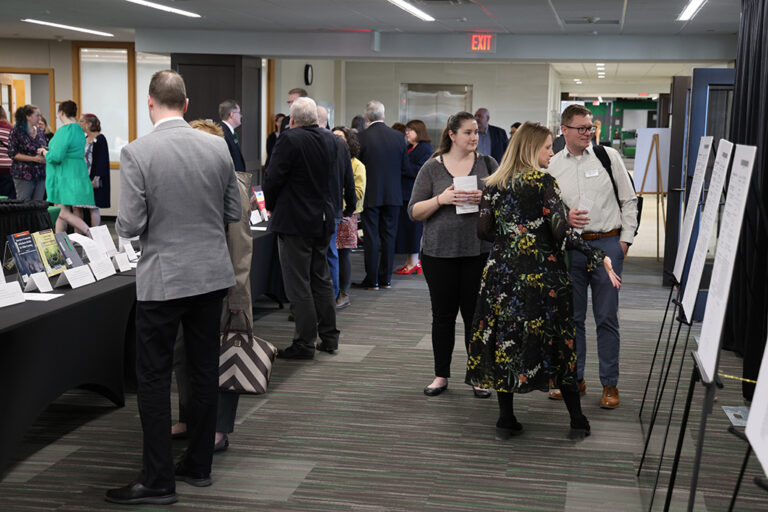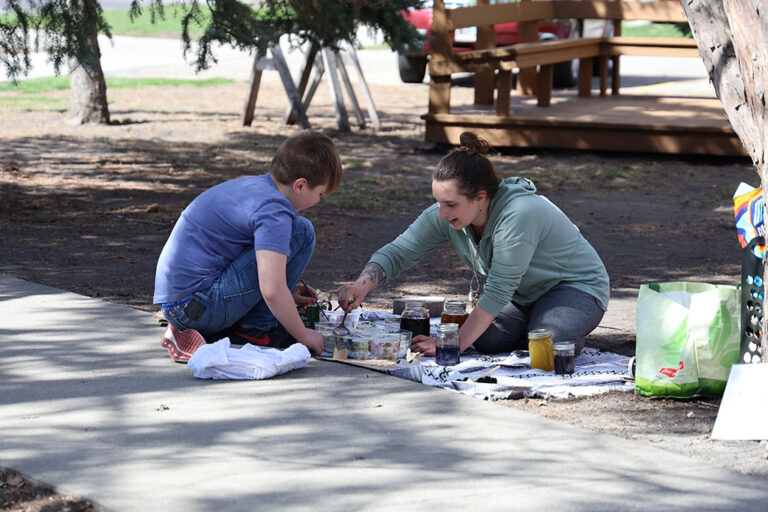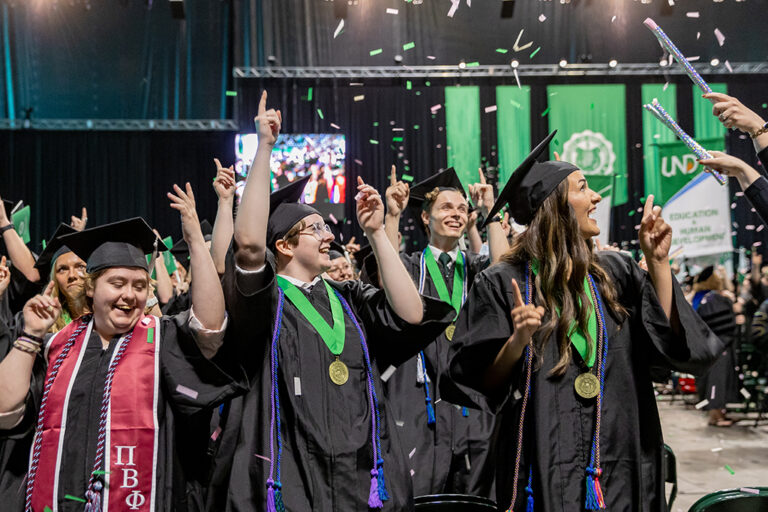Find your passion, then ‘embrace it, live it and share it’
Life lessons from a UND wildlife ecologist highlighted Summer Commencement 2023
More than 500 students received their degrees at the University of North Dakota’s summer commencement ceremony on Friday, Aug. 4, at the Chester Fritz Auditorium.
As many as 242 undergraduates and 275 master’s students and Ph.D. candidates were expected to graduate.
UND President Andrew Armacost presided over the ceremony, and Susan Ellis-Felege, professor of biology, was the guest speaker.
Below is the commencement speech delivered by Professor Ellis-Felege, who has been a faculty member at UND since 2011. Ellis-Felelge teaches courses in wildlife ecology, management and survey methods, and strives both to include students in her research and to create opportunities for hands-on learning inside and outside the classroom.
****

Thank you for the introduction, President Armacost, and thank you all for the opportunity to be here today. I am truly honored to be asked to offer the Class of 2023 congratulations and best wishes. I have to admit, though, I really struggled with what to share. As I reflected back on my own graduations, I did not remember who gave the speeches or even what they said and wondered how I could be different.
I have spent the last few weeks asking everyone I know, what did you want or would want to hear at your graduation? I Googled “what makes a good commencement address?” I got lots of suggestions about being positive, energetic and inspiring, but the most important piece of advice I have decided to take was from my undergraduate mentor, Dr. Margaret Voss, and that was to be passionate about what I share and speak from the heart.
So today, I am going to share some lessons I have learned from my passion – birds and the wild places they call home – a passion I have had since I was a little girl (trust me there are pictures), a passion that brought me to North Dakota – one of the most important places to study grassland and wetland birds, and a passion that will come as no surprise to those who know me or perhaps anyone that has ever talked to me.
I have learned a lot about birds and more importantly from birds and from studying them. They have shaped so much of my personal and professional life that the line between the two of them is pretty blurry. And the lessons I have learned seem to be applicable on so many different levels in my life. I challenge you all today to find your passion and when you have that passion embrace it, live it and share it.

Birds are often something most people can relate to. Why? Birds are everywhere. They can be important culturally, bird watching is a popular and dare I say addictive hobby, so they provide entertainment, they provide food, and do a variety of services for us such as eating insects, pollinating plants, and dispersing seeds. And most people have a bird story, maybe a good one, maybe a not so good one, and maybe you have one today as you crossed campus and had to battle the Canada geese that call the coulee home these days.
People have been studying birds for hundreds of years. If you go back to the 1700 and 1800s when it was popular and prestigious to study birds, they documented different kinds of birds and where they lived, how they behaved, so studying birds is something we should know pretty well. And we do; yet with almost 10,000 species worldwid,e we are still learning new things about them. They have sparked curiosity in many, and certainly my curiosity that as a child often resulted in my dad, sister, and I being late for dinner or other events chasing birds. A curiosity that had me declare at age 13, I would become a waterfowl biologist and study ducks and geese as a career. A curiosity that allows me to keep learning and make a living. Have curiosity, follow that curiosity and even when you think you have learned it all, be open to the idea that there is more to learn… be a lifelong learner.
One of the coolest things about birds are their migrations. Many birds, especially birds we find in North Dakota, will participate in seasonal migrations. They will travel thousands of miles in a short time, endure sometimes formidable conditions to get to a new place for part of the year. This can be a truly amazing feat but filled with challenges.

Seasons
These migrations come with a change of seasons. They offer a fresh start; sometimes they get new feathers or a new look. These new feathers will prepare them for migrations or for breeding or just to replace feathers from wear and tear of everyday life. We, too, go through changes in seasons in our life. You are at one of those important junctures today. These seasons offer us a chance to change, grow, reinvigorate, and even reinvent ourselves. Like birds, sometimes the migration to a new season can be exhausting, while others bring out new colors or opportunities for us. For many birds, the change in seasons result in opportunities to dance and sing in both magnificent and silly ways, while other seasons are more subtle and low key… and maybe there is a little bit of both in a season.
I feel truly fortunate to have had many seasons in my life that have taught me the value of both exhausting, challenging seasons of life – like the gauntlet of a my Ph.D. or the challenge of re-invigorating a fisheries and wildlife program that had been struggling – to my current season with my amazingly energetic, big personality of a daughter, Kaylee, and a brand new son, Karsen, that make me dance, sing and often embrace silly as a badge of honor.
Embrace the journey
I tend to be a pretty goal-oriented person, sometimes to a fault. However, I have come to appreciate birds that embrace what is known as a stopover site along their migration. This is a place where they take a break along the way. Sometimes these stops are to replenish resources and obtain resources they will need at their final destination. They are a place to reenergize so that they can make it to the other end of the migration. The saying from Ralph Waldo Emerson, “it’s not the destination, it’s the journey,” really applies here. Each of these stopovers provides an opportunity for you to leave a little bit of something there from you as you will pick up something. These pauses to catch your breath are not a waste but perhaps some of the most important parts of the migration that rejuvenate you so you can successfully arrive at your destination.
Birds fly in a variety of ways
Some soar and admire the sites below, others will flit their way around much like a woodpecker in pulses, yet others demonstrate speed and agility much like a fighter jet that is mission focused, others will take short bursts of flights and incrementally move towards their destinations. Some birds, like penguins, use their wings to fly through the water. Each can be effective and depend on the individual and environment they are in. Don’t feel like you need to adopt the strategy that others are using, do what works for you, don’t be afraid to be unique, and sometimes you may need to adapt strategies. Those same wings that carry a duck thousands of miles in a migration help diving ducks propel themselves far below the surface in lakes to seek food. Take from this, that you should not fear to apply your gifts in unique and novel ways.

Storms
Sometimes birds will encounter storms along their migration route. It will blow them off course. Don’t let getting sidetracked be the end of you. There are important lessons to be learned from something you might perceive as a failure. Sometimes stopping where you didn’t plan might mean finding something really valuable out, a place where you may really flourish that you didn’t expect, or a new flock that will share in future migrations.
Roots
North Dakota is one of the most important breeding grounds in the world for birds where so many birds get their start. The productive grasslands and wetlands of the prairies provide them with important resources that will help them grow their first set of feathers and carry them through their first migration and season. Don’t forget your roots. Let your North Dakota roots be a guiding light for you as they have provided a strong foundation for future migrations and seasons.
Ecosystem Impacts
Millions of birds will use or make North Dakota their home at least seasonally, but these birds will travel all over, making stops to reach destinations thousands of miles away, impacting different ecosystems. As we migrate through the seasons of our life, we leave a little bit of us at each stop, just like we pick up a little bit of that place, that time, and those around us. Ultimately, we become an amalgamation of all of these experiences that then get transferred on to all of those people and places that we stopped at along our migration. Each of our stops leads to leaving your legacy and even a little bit of your North Dakota and UND roots all over. Just like the birds, you have an impact, often larger than you realize, and each of you has already had an impact here at UND.

Pick your flock carefully
As I reflect on the seasons of my life and the migrations I have made from one to the next, I realize how important it is to pick the right flock to surround yourself with. You see when geese and cranes take off on their annual migrations, they often fly in a V-formation. Why? Because that formation allows for the birds to take turns leading and being led, as the birds following are able to draft off the ones in front of them to make the flight easier and to use less energy. They take turns in this role. I have made migrations from childhood and undergraduate work in Pennsylvania to my graduate work and first teaching job in Georgia to the start of my career and starting a family in North Dakota.
Each of these migrations to a new season in my life have been impacted by the flock around me, and at times they have carried me, and at other times I have been able to lead the migration.
Perhaps our initial flock may be family, and for me it was my mom, a teacher, and my dad, a game warden and avid conservationist that shaped my entire career path, as I am a perfect blend of these two amazing people. It was my sister who was my first and remains my longest best friend. She is the one who truly prepared me for a world that would challenge me to my extreme and defend me to the end of the earth. In college there were a couple of professors who prepared me for the career I never thought I would be doing, a professor. One of those, Dr. Voss, continues to mentor me and is the person I strive constantly to emulate in the classroom. I would meet my best friend and partner in life – the other Felege here at UND – who has supported me on more birding and life adventures than I could have imagined. It was my Grandma Evelyn who would be the only person to understand my experience as I had a boyfriend who would become my husband sent off to war for a year.
My Ph.D. was where I found how important it was to start leading. I got to mentor undergraduates and peer graduate students and find out maybe that professor thing might actually not be too bad of a gig after all. I had a major professor and UND Alum, Dr. John Carroll, who gave me the chance to unleash my creativity and learn how to stand up for myself professionally because I had developed skills that meant I could lead. There was an older couple, the Hefners, that took in some newlyweds pursuing graduate school and helped us make our first home and have family away from family.
There have been many seasons for me here at UND as I started my “big kid” job in one of my dream states for working on birds. Each project I have taken on has allowed me to collaborate with a variety of people from undergraduate and graduate students to professionals and alumni in the field. While my students often find me to be the mentor, I can’t express how much I have learned from so many of them and how much they inspire me each and every day. My time at UND has offered me so many opportunities to mentor and be mentored – to lead and follow on a daily basis – to truly be a part of a flock.
Along the way my husband and I and our kids, dog included here, have been adopted by the people of North Dakota and at UND who have become our flock. You see, as I look at the seasons in my life, I realize the importance of picking the right flock… the one that challenges you to grow, the one that accepts your unique feathers that stand out, the one that appreciates your talents and accepts you and your passions.
No matter what season you are in, or which direction your migration is headed, pick your flock carefully because you will become part of them and they a part of you and those people will shape the highlights of that season. Don’t be afraid during each season to be mentored and lean on others but also to step up to the challenge of leading and being a mentor, as your flock will carry you sometimes, while you carry them at other times in the migration through life. While I set out to study birds, it is the flock of people that have surrounded me that have really shaped the seasons of my life and been a special part of each of my migrations.

You may not remember who gave your commencement address, but I hope you remember that today’s the day you get to start a new season in your life, migrate to your next adventure. You have made us proud as you end this season and begin your next. So like baby birds that have garnered all that they can from the nest, spread your wings today, take a leap and fly, even if it is a little bit scary. Now is the time for that fresh new set of feathers, a time to sing and dance, and a time to fly in your own way. This season and all you have learned will be an important part of all the future migrations you will make, you will share pieces of it from the people who impacted you and the experiences you had.
You will pass on some of your UND season with those along your way, such that UND will impact those people and places you will visit… your own UND legacy. No matter which way you fly, spread those wings and fly with a passion, pick your flock carefully, embrace your journey, and remember your roots gave you all you need to impact the world in amazing ways you may not have even planned. Congratulations and best wishes. Thank you.
Susan Ellis-Felege is a professor of wildlife ecology and management at UND. During her career at UND, she has received the UND Foundation’s Outstanding Undergraduate Teaching and Faculty Scholar for Excellence in Teaching, Research and Service awards and was twice named the Wildlife Society’s Student Chapter Advisor of the Year.


